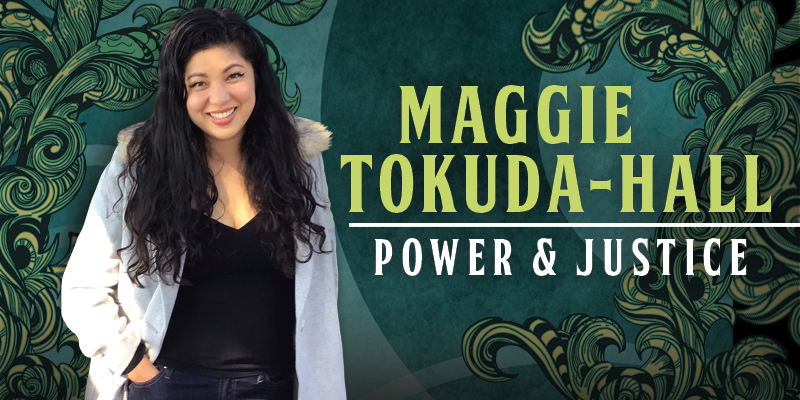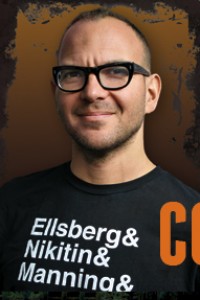Maggie Tokuda-Hall: Power & Justice

Maggie Tokuda-Hall was born in 1984 and grew up in California, living in the Bay Area and Los Angeles. She earned a BA in studio art from Scripps College in Claremont CA, and an MFA in writing from the University of San Francisco.
Her debut novel, queer YA fantasy The Mermaid, the Witch, and the Sea, appeared in (2020) and was selected for the Otherwise Award honor list; a sequel is forthcoming. Her first publication was picture book Also an Octopus (2016), illustrated by Benji Davies. Love in the Library, illustrated by Yas Imamura, is due out in early 2022. She also writes graphic novels, including werewolf YA Squad (2021), with illustrations by Lisa Sterle, and the forthcoming The Worst Ronin (2024), illustrated by Faith Schaeffer (2024).
Excerpt from the interview:
“All the books I’ve written for young adults at this point are about power and justice, and how that functions in an intersectional world. One where you can be a woman in a misogynist society, but you still have more power than somebody because of the color of their skin or their sexuality or whatever. When I was writing The Mermaid, the Witch, and the Sea, I was tasked with creating a whole other world, and making decisions about which power structures would stay and which would go was really difficult. I ended up making a lot of choices where I know I had the opportunity to write a more utopian world where some of these things didn’t matter, but in order to get at the questions of the power of colonialism, I had to address patriarchy, misogyny, homophobia, transphobia, racism, and xenophobia. All of those power structures work together to make co-lonialism such a potent and painful presence in the world, and so even though I was writing another world, I still had those subjects in mind. I read authors like Becky Chambers, and think, ‘Wow, it’s so cool that there are authors who can imagine worlds with just as much tension, and stories with just as many stakes, without those prejudices.’ I’m thinking of the Chambers book To Be Taught, if Fortunate, specifically, which is even about colonialism, and about imagining a space exploration future where colonization is not the goal. It’s like a kick in the shins to Heinlein, and I’m all about it. That’s, unfortunately, not the way that my imagination works. I go for my own emotional realism, and I like to include that in wild, made-up worlds, or in stories with fantasy elements. I’m in awe of people like Chambers, because she can convey emotional realism without harping on about homophobia, say, because she has the breadth of imagination to create a world that isn’t defined by that. I’m not able to imagine those kinds of worlds, although I really respect authors that can. (I want to note this is completely self-imposed criticism of what I think about the ethics of writing a fantasy world. Especially when you’re writing for teenagers, you have the opportunity to go completely off script, and I absolutely respect that as a method, but that’s not what I’ve tried to do.)
“The Mermaid, the Witch, and the Sea is a story about an orphan who goes by Florian, and who also refers to herself as Flora. She’s a bigender, genderfluid pirate who has taken refuge on a pirate ship with her brother as a means to escape the horrible conditions she was living under back in the main imperial city. Also from this main imperial city is a well-to-do rich girl named Evelyn who’s queer and whose parents know it, and are ready to get rid of her. If they can do that for their own benefit, they will, so they do. They arrange for her to marry someone named Finn Callum and send her off on this pirate ship (disguised as a passenger ship) to go meet him. It’s a story about two young kids whose entire lives have been dictated to them, and in meeting each other and falling in love, they find the necessity to go off script. What follows from there is a magic adventure with mermaids and witches and kissing and all the good shit.
“I always knew that Flora and Evelyn would end up together. That’s it. That was the only thing I knew – no matter what else happens, they will live happily ever after with the cameras spinning around them and you’re watching them make out from every angle, just like they do in every heterosexual fantasy romance. That was like the big goal, to have that ending. I spent so much time rewriting the beginning that I didn’t write the second two-thirds until November 2016, when I did NaNoWriMo.
“I’m proud of Evelyn’s character. On the one hand, she is incredibly good at identifying injustice when she witnesses it, but she has a supreme blind spot about her own privilege. I don’t think it’s a coincidence that both of her major romantic entanglements happened with people with whom the power dynamics are skewed in her favor. I don’t think that she recognizes that about herself, and I don’t think she necessarily deserves punishment for it, either. She does work as a stand-in for a lot of people, myself included, who exercise a lot of privilege in the world. I get to be American when I travel abroad – that’s one of those things I think we all take that for granted. We come from so much money and infrastructure that when you step into, say, rural Peru, you’re like an alien. You’re coming in with so much privilege. Evelyn isn’t a bad person, but she also doesn’t recognize her power, and I really enjoyed writing her character for that reason. The moral of the story isn’t that Evelyn’s a bad person or deserves to be punished. There’s no moral to The Mermaid, the Witch, and the Sea, besides maybe ‘Queer love is salvation.’
“I sold the The Mermaid, the Witch, and the Sea in 2018, and it came out in 2020. It sucks to get published during the pandemic, especially May 2020, when we didn’t know what the fuck was going on. The good news was I had been working with Charlie Jane Anders and a bunch of other authors, like Alia Volz and Mike Chen, to do this initiative called We Love Bookstores, where we were doing fundraiser events for bookstores. I folded my launch in with that and made it a fundraiser for Books, Inc. That was awesome, and ended up being really successful and great. I did a conversation with Charlie Jane and Victoria Schwab. Victoria Schwab is way too important and famous to do an event with me in real life, so it was great that we could sneak that in thanks to the pandemic. I would say it’s more of a bummer this time, the second time, because Squad came out last week, and at least with The Mermaid, the Witch, and the Sea the whole time I was doing all these Zoom events and stuff. I was like, ‘It’s okay – by the time Squad comes out, you’re going to get to talk to teenagers, it’ll be great.’ And, well.
Interview design by Stephen H. Segal.
Read the full interview in the December 2021 issue of Locus.
 While you are here, please take a moment to support Locus with a one-time or recurring donation. We rely on reader donations to keep the magazine and site going, and would like to keep the site paywall free, but WE NEED YOUR FINANCIAL SUPPORT to continue quality coverage of the science fiction and fantasy field.
While you are here, please take a moment to support Locus with a one-time or recurring donation. We rely on reader donations to keep the magazine and site going, and would like to keep the site paywall free, but WE NEED YOUR FINANCIAL SUPPORT to continue quality coverage of the science fiction and fantasy field.
©Locus Magazine. Copyrighted material may not be republished without permission of LSFF.







